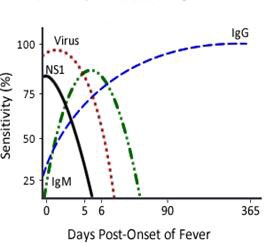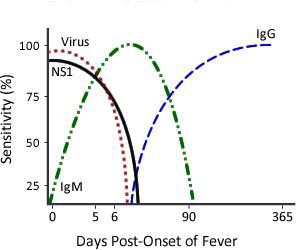Introduction
Dengue virus belongs to the flavivirus genus of the family Flaviviridae, and is transmitted to humans by Aedes aegypti and Aedes albopictus mosquitoes. Dengue virus has four different serotypes i.e Den 1, 2, 3 and 4. It is found throughout the tropical and subtropical region of over 100 countries. Over 300 million dengue cases occur each year and approximately 2.5 billion people are at risk for infection worldwide.
Symptoms
In dengue infection, the incubation period varies from 3 to 7 days. While some infections remain asymptomatic and majority of individuals will develop classic dengue fever.
Symptoms of Dengue Fever
- Sudden, high fever.
- Severe headaches.
- Pain behind the eyes.
- Severe joint and muscle pain.
- Fatigue/tiredness.
- Nausea
- Vomiting.
- Skin rash, which appears two to five days after the onset of fever.
Dengue NS1 Antigen Test
Nonstructural glycoprotein NS1 antigen is one of the diagnostic markers for dengue infection. It is found in all serotypes of dengue virus and it circulates at high level during the first few days of illness. NS1 antigen assay is an effective tool for diagnosis of dengue virus infection, especially within the first few days of illness. It is expected to be detected 1 day after the onset of fever and persist up to 7- 9 days in both primary and secondary dengue infection. Hence the detection of the NS1 antigen has been shown to be useful as a tool for the diagnosis of acute dengue infections
In general, diagnosis of dengue is dependent on the phase of the infection, primary dengue or secondary dengue. A primary (first) dengue infection, IgM antibody is the first antibody to appear and the levels are very high. IgG antibody is detectable at low titre at the end of the first week of illness as shown in Figure 1. In contrast, a secondary infection, IgM levels are lower and IgG antibody titres rise extremely rapidly. High levels of IgG are detectable in the acute phase and they rise dramatically within two weeks (Figure 2).
 |
| Figure 1: Primary dengue virus infection |
 |
| Figure 2: Dengue |
Source: cdc.gov/dengue/clinicallab/laboratory (Laboratory guidance & diagnostic testing)
Importance of Dengue NS1 Antigen Test in preventing delayed diagnosis of dengue shock syndrome
Laboratory tests are of diagnostic value during the acute phase of the illness. Since children and young adults remain at increased risk for progression to dengue hemorrhagic fever and dengue shock syndrome, accurate and timely diagnosis of dengue virus is important for early detection of dengue virus infection. NS1 antigen detection is preferred because of its presence at high concentration in the blood of dengue-infected patients during the early clinical phase of the disease. Early and accurate diagnosis of dengue is important due to several reasons:
- Dengue virus infection produces a broad spectrum of symptoms, many of which are non-specific. Thus, a diagnosis based only on clinical symptoms is unreliable
- An early and accurate diagnosis can assist in patient management by directing clinical attention to the appearance of major warning signs of severe or even life threatening complications.
- An accurate dengue diagnosis prevents unnecessary and possibly expensive antibiotic usage.
- Prompt diagnosis of index cases can facilitate vector control activities in the community so as to mitigate further transmission.
- The expanded use of accurate dengue diagnostics provides important data on the epidemiology and health burden of dengue and in doing so can inform and guide public health policy, particularly as dengue vaccines and anti-virals make their way through development pipelines.
Sensitivity and Specificity NS1 ELISA test
The NS1 ELISA based antigen assay is commercially available for dengue virus and many investigators have evaluated this assay for sensitivity and specificity. NS1 ELISA assay was sensitive for the diagnosis of acute dengue and it is more sensitive in test samples collected within 3-5 days of illness. The NS1 assay may also be useful for differential diagnostics between flaviviruses because of the specificity is high in patients who had no evidence of acute or recent dengue infection
Limitation of the Test
NS1 tests are most sensitive when used during the first 3-5 days of illness and are most likely to be positive if the patient has primary dengue. A positive NS1 test result is a reflection of the amount of virus in the blood, where patients with high amounts of virus in the blood are more likely to be NS1 positive combining NS1 assay with IgM and or IgG detection may provides increased diagnostic sensitivity.
Conclusion
Early diagnosis of dengue infection is very important because if the symptoms are ignored for a long time, it can result in Dengue Shock (DS) or Dengue Hemorrhagic Fever (DHF). These are the primary causes of death. Early detection allows for prompt treatment of the patient. Early diagnosis also prevents needless investigations and treatment. It helps in proper management if any complication returns and also their prevention. It is advisable to find a medical centre which uses the NS1 Antigen Test for earliest possible detection of Dengue. The Dengue NS1 Test is the most useful for early detection and prompt treatment.
NS1 antigen test can be used to complement the current antibody test used in peripheral laboratories. Thus, the combination of the NS1 antigen and antibody tests could increase the diagnostic efficiency for early diagnosis of dengue infection.
References
- Rosanna W. Peeling, Harvey Artsob, Jose Luis Pelegrino, Philippe Buchy, Mary J. Cardosa, Shamala Devi, Delia A. Enria, Jeremy Farrar, Duane J. Gubler, Maria G. Guzman, Scott B. Halstead, Elizabeth Hunsperger, Susie Kliks, Harold S. Margolis, Carl M. Nathanson, Vinh Chau Nguyen, Nidia Rizzo, Susana Vázquez & Sutee Yoksan. Evaluation of diagnostic tests: dengue. Nature Reviews Microbiology, S30-S37
- V. Kumarasamy, A.H. Abdul Wahab, Z. Hassan, Y.K. Chem, M. Mohamad, K.B. Chua., Evaluation of a commercial dengue NS1 antigen-capture ELISA for laboratory diagnosis of acute dengue virus infection. Journal of Virological Methods Volume 140, Issues 1–2, March 2007, Pages 75–79
- S Datta, C Wattal. Department of Clinical Microbiology, Sir Ganga Ram Hospital, Rajinder Nagar, New Delhi – 110 060, India. Dengue NS1 antigen detection: A useful tool in early diagnosis of dengue virus infection. Indian Journal of Medical Microbiology. Year : 2010, Volume : 28, Issue : 2, Page : 107-110
- Shiran Ajith Paranavitane, Laksiri Gomes, Achala Kamaladasa, Thiruni N Adikari, Nilanka Wickramasinghe, Chandima Jeewandara, Narangoda Liyanage Ajantha Shyamali, Graham Stuart Ogg and Gathsaurie Neelika Malavige. Dengue NS1 antigen as a marker of severe clinical disease. BMC Infectious Diseases 2014, 14:570
- Subhamoy Pal , Allison L. Dauner, Indrani Mitra, Brett M. Forshey, Paquita Garcia, Amy C. Morrison, Eric S. Halsey, Tadeusz J. Kochel, Shuenn-Jue L. Wu. Evaluation of Dengue NS1 Antigen Rapid Tests and ELISA Kits Using Clinical Samples. November 20, 2014
- Selvaraj Stephen, Marie Victor P Charles, Velmurugan Anitharaj, Civamany Deepa, Sivaraman Umadevi. Department of Microbiology, Mahatma Gandhi Medical College and Research Institute, Pillaiyarkuppam, Puducherry, India. Early dengue diagnosis by nonstructural protein 1 antigen detection: Rapid immunochromotography versus two the enzyme-linked immunosorbent assay kits. Year : 2014 | Volume : 57 | Issue : 1 | Page : 81-84
| Last Reviewed | : | 23 August 2017 |
| Writer | : | Anni Sofiya binti Bachok @ Mahmood |
| Translator | : | Anni Sofiya binti Bachok @ Mahmood |
| Accreditor | : | Asmah binti Ibrahim |







